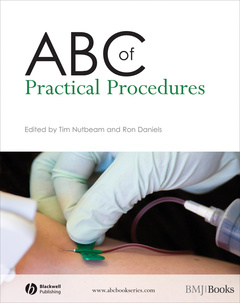Description
Abc of practical procedures (series: abc series) (paperback)
Authors: NUTBEAM Tim, DANIELS Ron
Language: English
Approximative price 44.30 €
Subject to availability at the publisher.
Add to cart152 p. · 24x16.4 cm · Paperback
Description
/li>Contents
/li>
This ABC will fill a gap in the practical guidebook for junior doctors category.
Medical training is now competency based - each year within a training scheme (including FY1 and FY2) is associated with new "core" competencies. These competencies include both personal skills (history taking and presentation, breaking bad news, communication skills etc) and practical skills. Each trainee throughout their training will have multiple competency based practical assessments - these are referred to as DOPS or Direct Observed Practical Skills.
As yet there is no core text which covers these practical skills. Many specialty texts include relevant practical skills - but usually only covered as an 'aside'. A single text book covering all the required FY1, FY2 and non-specialist ST procedures in sufficient detail will be be invaluable both to the trainee and the educator.
In addition to this there is increasing pressure to 'practicalise' the medical curriculum currently taught in UK medical schools. To this effect many 3rd, 4th and 5th year medical students are now being taught FY1 competencies earlier on in their training in specific practical procedure sessions.
The ABC of Practical Procedures is designed to meet the needs of these groups.
AFTER:
Medical training is now competency based. These competencies include both personal skills (history taking and presentation, breaking bad news, communication skills etc) and practical skills. Throughout their training, each trainee has multiple competency based practical assessments - referred to as Direct Observed Practical Skills (DOPS).
This unique ABC teaches these core skills required of all junior doctors in training. Tailored to the needs of the Foundation Programme, but equally relevant for all medical students, each stage of each procedure is illustrated with colour step-by-step photographs as it is being performed, a "useful tips/handy hints" box for key learning, while the ABC website, at includes videos of DOPS.
2) Consent and Documentation: The four elements of informed consent (and the legal aspects behind this), the importance of complete documentation, examples of incomplete and complete documentation.
3) Universal Precautions and Infection Control: The principals and practice of setting up a sterile field, various skin preps (iodine, chlorhexidine etc




